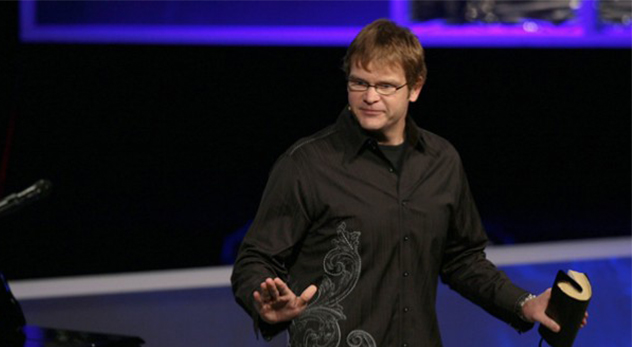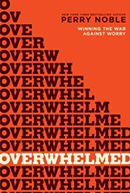
Prominent Pastor Perry Noble of South Carolina confesses his mental health struggles. – Image Courtesy of NewSpring Church
In a blog published this week titled, “Should Christians take Medication for Mental Illness?,” mega-church pastor Perry Noble said Christians struggling with anxiety or depression should consider taking mood-altering drugs to help them cope. He admitted that he used to believe mental illness could be treated with prayer and scripture, but Perry said he has “done a complete 180 in regards to how I used to feel about them.” The leader of NewSpring Church in South Carolina credits the transformation to a period in his life that began in 2008, which he called “darkest time of my entire life.” For the next three years, Noble said he wrestled with depression and even contemplated suicide. He also shares these stories in his new book, “Overwhelmed: Winning the War Against Worry,” due out April 1.
Here I talk to Pastor Noble about his struggle with suicidal thoughts, antidepressants, and what advice he gives Christians who have mental health issues.
RNS: You’ve now shared with the world that you’ve been depressed and considering suicide. Can you share more about your journey to that place?
PN: I was on my way home from work one day and had this thought: “I wish someone would run that red light, hit my car and kill me instantly.” Soon, my thought about someone else taking my life led to me thinking thoughts–infrequent at first, becoming more frequent as time went on–about taking my own life. I remember sitting on the back porch of my house when I reached a breaking point and actually saying, “I am going to do this.”
That thought still freaks me out. I was so close.
RNS: The use of antidepressants has increased 400% in the last 20 years. Should this concern us? What about Christians who say “Rather than medicate, we should learn to rely on God more?”
PN: I believe in the power of prayer. I believe God can heal people. I have seen Jesus heal people in miraculous ways. But I also believe in the miracle of modern medicine and am very thankful for it. The brain is an organ in the body, just like the heart or lungs or the liver. If there was a pill I could take to make my heart, lungs, or liver more healthy but refused to, people would call me irresponsible. Why not apply that same logic to the brain?
RNS: Pastors often say they feel they have to avoid admitting their flaws to maintain credibility. What allowed you to admit you needed help with your battle against anxiety and depression?
PN: I used to have this mentality very early on in my ministry, and was actually told by an older pastor once that people in the church “need a hero, and that hero needs to be the pastor.” He went on to tell me that the pastor needs to be someone who has it all together or no one would want to come and talk to him about their problems. Several years into my ministry, I discovered that what I had been told was so far from reality. People do need a hero, they do need someone to look up to and admire, and that person is Jesus.
There are zero examples of people in Scripture who had it all together. Every Biblical hero we have had some sort of issue they dealt with, and the strength of their stories is not that they were perfect, but that God loved them through their imperfections. That God used them not because they were super human, but because He uses broken things for His glory and our good. As I began pastoring I discovered that people relate so much better with my weaknesses and struggles than they do the illustrations where I am always the hero. And, to be very honest, I feel what pastors are saying in regards to “losing credibility with their people” is actually a masked way of saying, “I am way more worried about my reputation than actually helping people who are hurting.”
For too long the perception in the church has been perfection, in other words, you have to be perfect if you want to come here. Jesus did not teach or model this.
RNS: Some of the heroes of the faith like Moses, Daniel, and Elijah were deeply flawed. Yet, in many churches we lionize these individuals and romanticize their memories. Is this a problem?
So many people want the Bible to be a safe book, one with pictures that make us feel happy or even inspired. Reality is if the Bible were made into a full length movie it would be rated NC-17…and so many Christians can’t handle that reality because they have always viewed the Scriptures as a G-rated children’s book. God does not expect the church to protect the reputation of the people in the Bible. He put the stories there to show us that even godly people still struggled with sin, worry, stress, anxiety and even fear. It’s essential we embrace these realities because, if we do not, we will view the Bible as full of people who lived lives that are beyond reach for us “mere commoners,” thus causing us to become discouraged, label the Christian life as an impossibility and walk away.
RNS: Somebody reading this is drowning in a sea of despair or depression or stress or anxiety and don’t know how to get out. What’s your message to them?
PN: You have to tell someone. You cannot handle this alone. Jesus did not mean for us to walk through this alone. The lie we believe in our minds is that no one will understand. Nothing could be further from the truth. Healing begins when you ask for help, and it cannot take place until you do.






